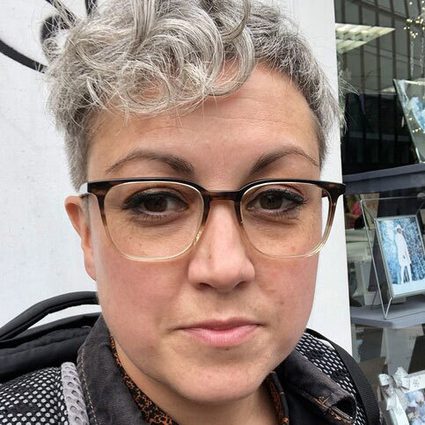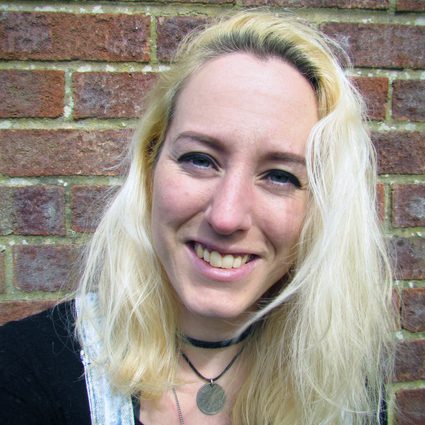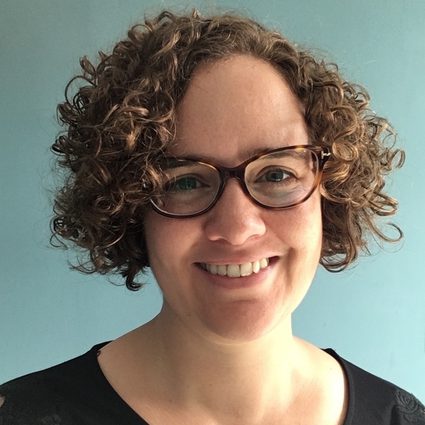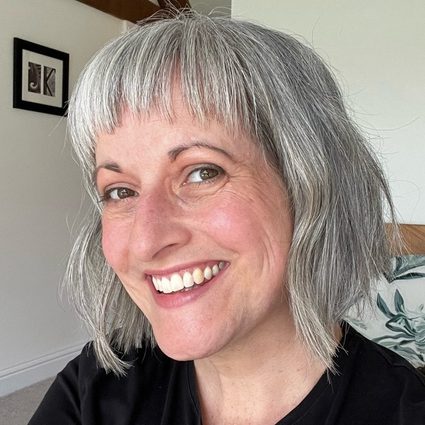Team Carbon Literacy training
In April 2023 the whole team took a day out from our usual work to learn more about carbon emissions – where they come from, the damage they do, and what we can do about it.
Run by Robin Lyons of Ergon Theatre, a leading climate theatre company, the Carbon Literacy training course included a mix of surprising facts, sobering predictions, and uplifting workshopping where we 'time-travelled' 40-odd years into the future. Highly recommended!
Also part of the course – and earning our Carbon Literate qualifications from the Carbon Literacy Project – we each pledged to make changes to help reduce our negative impact on the planet.
Six months later …
Now a decent chunk of time has passed, I asked some of the team what their biggest takeaways were, and how they’re getting on with those pledges …

Ceri
My biggest takeaway was that individually we make a difference, both in the worst sense but also – and potentially more importantly – for the better.
Before the training session, I was already using glass milk bottles – and that was a tick in the “I’m environmentally conscious” box.
But it was all too easy to think “What difference does it really make if I order that new t-shirt from China that I don’t really need, or eat lots of red meat, order exotic fruits, or use single-use plastic sandwich bags for the kids' lunchboxes? Those products would be made and shipped to the UK anyway. One sandwich bag isn’t going to make a difference.”
The training highlighted for me that we have a personal responsibility to reduce carbon emissions. We can’t solely rely on the government or big corporations to take action. There are plenty of small, manageable things that we can all do. But one adjustment or token gesture isn’t going to be enough. It’s not a tick-box, give-yourself-a-medal exercise; it’s an ongoing process. And the benefits – for our own lifestyle and in positively influencing those around us – are far-reaching.
My pledge:
I made two pledges. The first was to reduce red meat consumption and buy locally sourced produce. It’s been slow progress, but we’re moving in the right direction, and in a couple of months (once we’re back living in our own house – that's another story!) we’ll be making these adjustments more significant and permanent.
My second pledge was to walk my kids to school, instead of driving them. We still compromise on days when there are multiple instruments and PE kits to carry, but it’s making a really positive difference. And not just for the environment. It’s better for my working day, my bank balance, and it’s a really positive change for the children’s physical and mental health. Win, win!

Hayley
I’m usually a pretty vocal person but I shut all the way up when we calculated our carbon footprint because I was totally ashamed of mine; I didn’t share it.
In the last couple of years, I have taken more flights than I have in about 6/7 years previously, combined. I have long believed that individual, collective action, can be a very powerful tool in creating social change and I have definitely been turning a blind eye to my own behaviours.
In my head, I’d offset the flights that I was taking against the fact I live a vegan life, gave up my car, take public transport… but the reality of the calculations went against me.
My pledge:
The pledge that I made ‘publicly’ was to ensure that we install the Website Carbon calculator on all of our new websites – and we have already started to do that.
The pledge that I made away from the workplace was to limit myself to one long-haul and one short-haul flight per year. My partner loves to travel and will happily hop on a plane for a long weekend away, so negotiating how we adventure together now has been fraught!

Miriam
My biggest takeaway from the training was when we listened to ERGON: Threads – a short audio piece that follows the story of Charlie who is looking to buy a new cheap t-shirt.
The piece takes you on a journey, following every step of the t-shirt’s manufacturing process. I always thought I had a fairly good understanding of what was involved (the chemicals, the cheap labour, the global travel) but following the whole process in one go was eye-opening.
We had to try and write down every step which contributed to the carbon footprint of the t-shirt, and the impact that had on the planet. It was unbelievable. My list was huge. I could barely keep up with it!
My pledge:
I made two different pledges. The first one was to be much more aware of the impact of my decisions, and to be a little more open (and humble) about what I don’t know. I wanted to improve the food I ate, and reduce the number of new things I bought. I’m already on a predominantly plant-based diet, and have always been a big advocate for buying second hand. But there’s always room for improvement. I’ve only purchased two new items since the training in April – a pair of socks, and an extension lead!
Secondly, I vowed to share knowledge and guidance with clients wherever possible – helping them to make decisions that will reduce the carbon footprint of the content they add to their websites. Increasing the digital sustainability of one website can lead to a much bigger impact than you might think. Just think of all the people who access those pages!

Kate
My biggest takeaway was the power of sharing and inspiring other people to make changes. I often feel guilty or under pressure for not doing more in my personal life to reduce my impact. But the training made me think about how I can have the biggest impact – and it’s not always by making changes that only impact me.
Instead, providing training and resources to help other people reduce their impact can be a much better use of my time and energy. This has definitely given me more motivation to push for digital sustainability and put what I learned in my MBA – where I focused on Circular Economy and Digital Sustainability – to good use.
My pledge:
Being totally honest, I’ve completely failed at my personal pledge which was to move to a sustainable energy provider by the end of the year. The rising energy costs, inflation, and general cost of living increases make it difficult to make the move to a provider that’ll be about 50% more expensive. I’ve not totally dismissed it, and I plan to review the costs again before the end of the year, but I’m not sure I’ll make the move.
Despite failing at my actual pledge, however, something that really stuck with me from the training was ERGON: Threads which tells the story of a t-shirt from cotton farm to delivery. As an avid charity shop shopper and second-hand fan, I’ve made the small shift from vintage kitchenware to second-hand clothes. Whilst I’ve never been averse to second-hand clothes, I’ve never really put much effort into sourcing what I need second-hand. But ERGON: Threads really stuck with me, and it’s really made me rethink and question buying new clothing.
Whilst I feel guilty for not achieving my actual pledge, hopefully this will show that not achieving a pledge is okay. And sometimes you can find changes that require little effort but result in a big impact – and are actually quite fun too. (Don’t ask me about setting up sewing machines though…I think I’m a long way off being able to easily customise my charity shop finds!)

Katie
As for me, my biggest takeaway from the training was a realisation during the 'day in the life' role play section.
Having roughly charted a day in the life of Josh now, we were 'transported' 40-odd years into the future. A future where can no longer use energy from fossil fuels. We were then tasked with identifying all the things that would need to change in Josh's daily routine to avoid fossil fuel usage.
It was a lot! Pretty much everything in our lives involves fossil fuel energy – to some extent or at some point in its manufacture. Just having a cup of coffee, for example. The kettle! The water! The coffee! The mug, even. They all involve so many process, materials, transportation. It's made me much more mindful of the impact on the planet of things I use and do day-to-day.
My pledge:
I do the cooking in the house, so I pledged to cut down on meat consumption and buy more locally-sourced food. It’s going okay – I'm lucky that we live in farming country, so there’s a good choice of things that are grown, reared, and produced nearby.
There's something really nice and wholesome about having milk delivered (via electric milk float and in reusable glass bottles), and knowing it's from cows that freely roam in acres and acres of beautiful fields just down the road. Plus, I love veggie food – I was properly vegetarian for about 5 years, so I already had a few nice recipes up my sleeve. (Does that make mine a cheat pledge?!)
What works well for me is to start slowly and build-up to bigger change over time. So, I started by planning-in at least 3 vegetarian main meals a week. Now that I've grown my repertoire of tasty veggie and vegan recipes (after a couple of rotters!), we can go for a good couple of weeks without eating meat for dinner. I plan to keep cutting-down until eating meat at home is a rarity – or perhaps doesn't happen at all (if I can convince James!)
In the meantime, I'll carry on sneaking the best vegetarian/vegan recipes I test – and approve! – into Supercool's monthly newsletter ?
Carbon Literacy training is a great way to bring a team together, learn new things – and be a catalyst for positive action. It's pretty heartening that just a few hours of training can inspire people to make changes to their day-to-day lives, right?!
Details about Robin's course in 'carbon literacy and how to become a climate business leader' on Ergon Theatre's website.
What else we’re doing to be greener – plus loads of handy resources and ideas to help you become more digitally sustainable:
